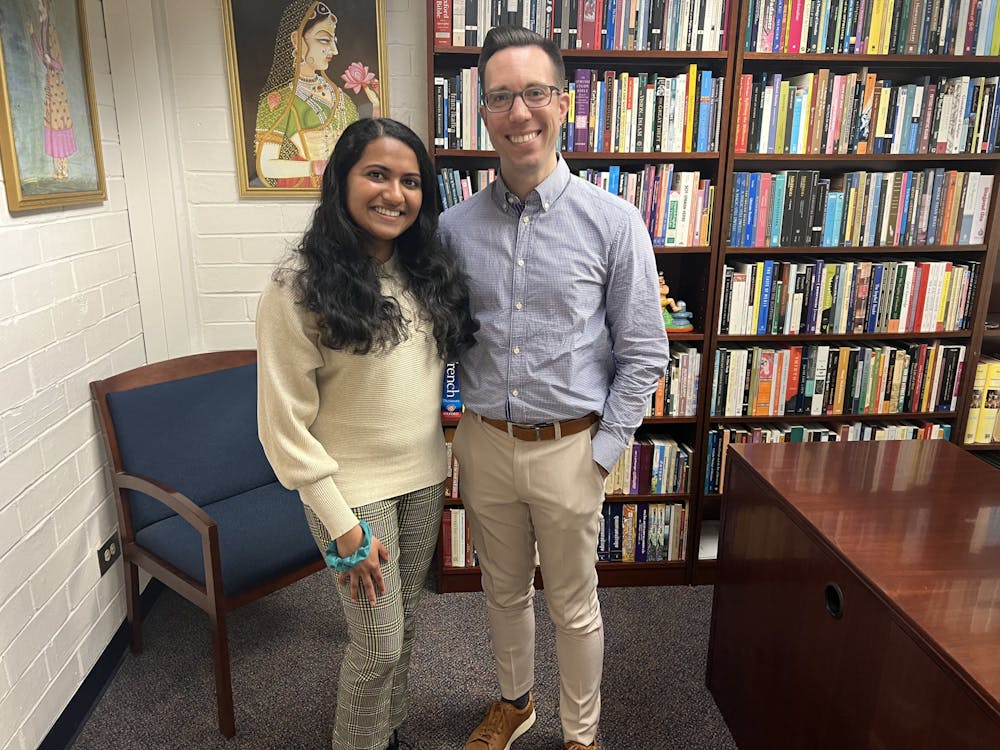Arsha Moorthy ‘24 is championing a new service project that is studying the role of chaplains in Middle Georgia. The research project will ultimately result in a guidebook to help communities in Macon better serve religiously diverse populations.
When Moorthy began college at Mercer, she double-majored in biochemistry and molecular biology and Spanish. Despite her focus on STEM research throughout college, religion has always been a topic of interest for her.
“My background is kind of interesting because my mom is Catholic and my dad is Hindu, so religion has been a big part of my life, and I've always just been surrounded by religious language,” Moorthy said. “I saw how it directly impacts who you are and your identity.”
As a highschooler, Moorthy volunteered at Northeast Georgia Medical Center (NGMC) in her hometown of Flowery Branch, Georgia. While she was there, she had the opportunity to shadow chaplains, who provide "compassionate care that respects the beliefs and needs of each person," according to the NGMC Website.
She witnessed the chaplains' impact helping patients come to terms with their unique situations, and providing spiritual guidance for the patients and their families. However, she also noticed a disconnect.
“I saw several instances where people didn’t feel happy, they weren’t at peace,” she said.
She observed a Muslim family in her predominantly Christian hometown having a particularly difficult time coming to terms with what was happening to their loved one.
“That really got me thinking, what does it take to be a chaplain?” Moorthy said. “Are they faithfully serving populations of all different religious backgrounds? How do they handle situations where they're not able to spiritually guide others through the process of dying?”
Moorthy is part of a Mercer honors program called Service Scholars, in which students pitch and execute a service project that involves the local community. For Moorthy’s fall semester of her sophomore year, she began brainstorming ideas for the project, and the idea of chaplains in Macon came to mind.
She met with another student in the service scholars program, Bhumi Patel ‘23, and they decided to work together on the project. Patel majored in neuroscience and plans on attending medical school. When Moorthy first told her about her idea, she was particularly interested in how they could combine research about chaplains with Patel’s passion for mental health.
“As a physician, I hope to make patients feel comfortable, understood, and cared for when communicating their needs,” Patel wrote in an email. “This research provides me a pathway to do so by hearing and connecting with people’s experiences with chaplainship care.”
They noticed that the literature on chaplains in the South was incredibly sparse. The last study was conducted in the 1950’s. When Moorthy and Patel realized there was no data for Macon, they decided to go out and survey their community for the first time.
Moorthy and Patel were able to get in contact with five chaplains from Atrium Health Navicent Medical Center in Macon. In the next stage of the project, they will send them a variety of survey questions covering areas ranging from educational background to how they help patients with a different religious identity from their own. They also plan on doing in-person interviews with leaders at various houses of worship, and community members who have had experiences with chaplains.
One professor who has been instrumental to the research process is Jason Smith, PhD, assistant professor of religion at Mercer.
Smith originally met with Moorthy in the fall of 2022 to discuss ideas for the project. They discussed how she was interested in health, religion, and wanting to do something for the public good that would benefit the community.
Smith described chaplains as frontline workers in hospitals, prisons, and other institutions.
“A chaplain in the context of a hospital is going to be someone who is trained with a set of resources to guide patients through challenging moments, with attention to the spiritual dimensions that may accompany those challenging moments,” Smith said.
Macon has long been rumored to be the town with the most churches per capita in the country. According to data from CauseIQ, there are 380 religious organizations and churches in the great Macon metro area.
According to Smith, while people don’t often think of Middle Georgia as religiously diverse, Macon has a wide variety of congregations including Jewish and Muslim communities and immigrants from South Asia.
“The region generally is as much in need of thinking about religious diversity in the context of health care as is a place like Boston, but because people don't think of it as needing this attention, I think sometimes those kinds of details can fall through the cracks,” Smith said.
Smith also emphasized the importance of the project’s interdisciplinary nature. Research in this genre helps religion students see the relevance of their major, and helps students studying medicine understand how having a knowledge of multiple religions can make them a better doctor.
In order to conduct surveys in the community, Patel and Moorthy had to first go through the Institutional Review Boards (IRB) approval process. The IRB process ensures that researchers dealing with live participants follow a series of ethical guidelines. The student worked to write up a proposal and submit it for approval with the help of other humanities faculty.
This Spring semester they are focused on gathering information and responses to the surveys, and are planning to present these findings at Bear Day. Fellow Service Scholar Reema Chande ‘25 will be taking over the project next year, after Moorthy graduates. Chande is the president and founder of Mindful Mercer, a club focused on mindfulness and mental well being.
In the long term, the final guidebook will be tailored to chaplains, but will also be extended to other communities in Macon that would benefit, like high school counselors and hospice care nursing homes.
Eliza Moore ‘24 is an English and Journalism student at Mercer University. She is now in her second year working as The Cluster’s News Editor after a semester abroad. She is currently producing work for Macon Magazine and Georgia Public Broadcasting in addition to her work with The Cluster. She loves breakfasts, the ocean, and all things related to writing.





